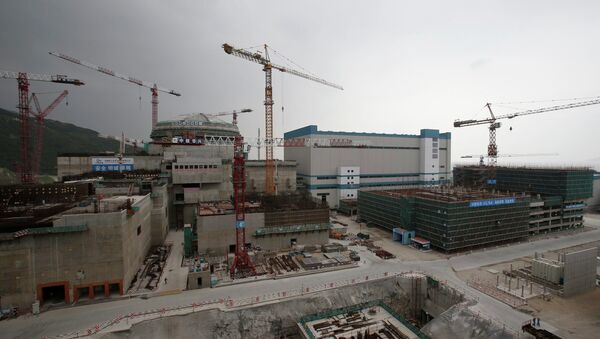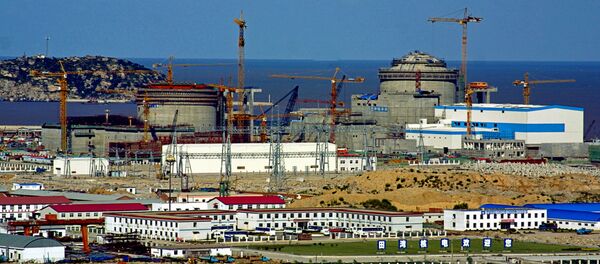China is determined to gain leading positions on the global nuclear energy market, commentators told Sputnik, adding that Beijing's breakthrough in the development of peaceful atomic technologies is closely connected with the country's One Belt and One Road initiative (OBOR).
"[The construction] of nuclear power plants as well as Chinese high-speed railways is one of the most important fields of cooperation… within the framework of the OBOR project," Wang Zhimin, head of the Center for the Study of the Globalization and Modernization of China with the Institute of Foreign Economy and Trade, told Sputnik China.
The Chinese scholar explained that the country possesses cutting-edge technologies in the atomic energy sphere: "In particular, Hualong One is the recognized leader in the line of nuclear reactors of the third generation in the world; it reflects the highest level of China's achievements in the nuclear power field."
On the other hand, Wang called attention to the relatively low cost of construction of nuclear power plants by China abroad. Simultaneously, the safety record of China-made atomic power stations is comparatively high.
The scholar believes that all countries which maintain cooperation with Beijing are interested in China's assistance in the construction of nuclear power plants: "These are, for example, Pakistan, Iran, other countries of the Middle East, Central Asia, and even a number of developed countries," Wang emphasized.
"In the long run, there is the possibility of a partnership between Chinese companies and their counterparts from the United States and Canada," Wang emphasized. "The development of cooperation with established economies in the area of peaceful atomic energy… is an important trend for China, which is paving the way for the country's access to the world market of export services in this sphere."
Anton Khlopkov, director of the Energy and Security Center think-tank, echoed Wang: "China is especially attractive because being a new player on the world market, that it is ready not only to build [nuclear power stations] at a quite cheap price, but also to invest in relevant projects," he highlighted adding that "today, when the cost of borrowed money is high enough, it is doubly valuable."
For his part, Sergei Pikin, head of the Energy Development Fund, rates China's potential in the sphere of nuclear energy, noting, however, that the Celestial Empire is becoming a competitor for not just Russia but other global players in the atomic market.
"Undoubtedly, China has gained immense experience in the construction of nuclear power plants in cooperation with Russia," Pikin said, adding that the country "is also known for the ability to actively copy the best achievements of the global industrial industry."
At the same time, the security issues related to the development of atomic technologies has taken on a new significance in the Middle East and Central Asia — the regions heavily affected by the spread of terrorism threat, Pikin pointed out.
According to the commentators, in the next five years, China will be able to increase the share of nuclear power in the country's energy balance.
Citing Professor Lin Boqiang of Xiamen University, Chinese media outlet Global Times reported Monday that in the period from 2012 to 2017, China accounted for more than 90 percent of the world's new nuclear projects.
The media outlet added that "the containment dome for the K2 project of Pakistan's Karachi nuclear power plant using Hualong One [atomic reactor] was successfully installed on Friday."
Besides this, China's nuclear power industry is making progress in the UK and Argentina, Global Times noted, referring in particular to the agreement signed by China General Nuclear Power Corp (CGN), French energy company EDF and the British government for the Hinkley Point C project in the UK. Additionally, CGN is expected to install its reactor at another plant in the UK at Bradwell in Essex.
Meanwhile, "nuclear power reached a record high of 3.9 percent of China's total power generation in the first half of this year," the media outlet noted, adding that "the number of nuclear power plants that are in operation in the Chinese mainland has reached 36, ranking fourth globally."





